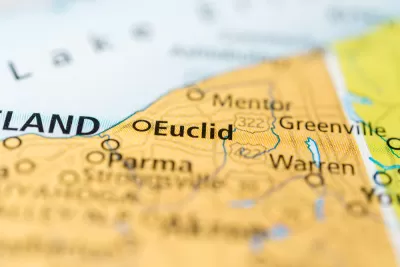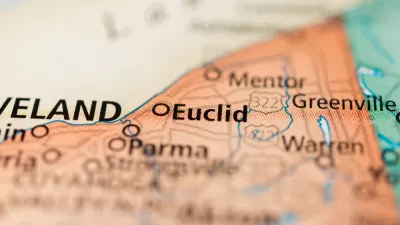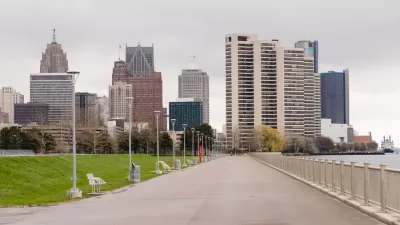Clear communication and a fair trade let Euclid, Ohio begin to rethink its lakefront—and its future.

Euclid, Ohio is not the first town built by Industrial Age magnates that undervalued a lake used more often for dumping trash than for recreation. And it is not the first town to reimagine that waterfront as an asset for current residents and a draw for new ones.
But like much of the waterfront on the Great Lakes, the properties that line the shore in Euclid are privately owned, and it might be the first town to figure out how to acquire that land without spending huge amounts of money, or seizing it through eminent domain.
Instead, Daniel J. McGraw explains in a long piece at NextCity, Euclid made a trade.
"In short, Euclid got 100-odd homeowners to voluntarily give the city their private lakefront properties so the public could ride their bikes and spread out their picnics there. Instead of monetary compensation, the property owners will receive in return what they’re betting is even more valuable: a new piece of infrastructure that will stabilize the bluff that their houses sit on above the lake, and a public park near their properties — something that might have once been seen as a drawback. The public, in turn, will finally get access to a prime swathe of their city’s waterfront."
Like many areas of Cleveland, Euclid was decimated by foreclosure during the Great Recession, but even before that the town was working to attract more residents after many of them left for outer-ring suburbs in the last few decades of the 20th century.
Euclid is about to get a massive Amazon distribution center in an old mall that may connect to the new park, and the new waterfront trail is part of a master greenway plan for greater Cleveland. So whether or not a "short waterfront trail" can "really contribute significantly to the city of Euclid’s rebound" is still an open question, but, McGraw writes, "It's not impossible."
FULL STORY: Did a Hundred Homeowners Just Change the Great Lakes Forever?

Alabama: Trump Terminates Settlements for Black Communities Harmed By Raw Sewage
Trump deemed the landmark civil rights agreement “illegal DEI and environmental justice policy.”

Planetizen Federal Action Tracker
A weekly monitor of how Trump’s orders and actions are impacting planners and planning in America.

How Atlanta Built 7,000 Housing Units in 3 Years
The city’s comprehensive, neighborhood-focused housing strategy focuses on identifying properties and land that can be repurposed for housing and encouraging development in underserved neighborhoods.

In Both Crashes and Crime, Public Transportation is Far Safer than Driving
Contrary to popular assumptions, public transportation has far lower crash and crime rates than automobile travel. For safer communities, improve and encourage transit travel.

Report: Zoning Reforms Should Complement Nashville’s Ambitious Transit Plan
Without reform, restrictive zoning codes will limit the impact of the city’s planned transit expansion and could exclude some of the residents who depend on transit the most.

Judge Orders Release of Frozen IRA, IIJA Funding
The decision is a victory for environmental groups who charged that freezing funds for critical infrastructure and disaster response programs caused “real and irreparable harm” to communities.
Urban Design for Planners 1: Software Tools
This six-course series explores essential urban design concepts using open source software and equips planners with the tools they need to participate fully in the urban design process.
Planning for Universal Design
Learn the tools for implementing Universal Design in planning regulations.
Jessamine County Fiscal Court
Caltrans
Institute for Housing and Urban Development Studies (IHS)
City of Grandview
Harvard GSD Executive Education
Toledo-Lucas County Plan Commissions
Salt Lake City
NYU Wagner Graduate School of Public Service





























